#speech therapists
Explore tagged Tumblr posts
Text
Signs Your Child Could Benefit from Speech Therapy

Every child develops at their own pace, and it’s natural for some kids to be ahead or behind in certain areas. However, when it comes to speech and language skills, delays or difficulties can affect a child’s ability to communicate, learn, and socialize effectively. Identifying these challenges early and seeking professional help from a speech therapist can make a world of difference.
In this blog, we’ll discuss common signs that indicate your child might benefit from speech therapy and provide guidance on when and how to seek support.
What Does a Speech Therapist Do?
Speech therapists, or speech-language pathologists (SLPs), are trained professionals who help children improve their communication skills. This can include:
Enhancing vocabulary and sentence structure.
Improving pronunciation and articulation.
Addressing stuttering or fluency issues.
Supporting language comprehension.
Helping with social communication skills.
Common Signs Your Child May Need Speech Therapy
1. Limited or Delayed Vocabulary
By 18 months, most children should be able to say at least 10 words, and by age 2, their vocabulary should include around 50 words or more. If your child has significantly fewer words or struggles to name familiar objects, this could be a sign of delayed language development.
2. Difficulty Combining Words
By the age of 2, children typically start combining 2–3 words into simple sentences, like “want toy” or “go outside.” If your child isn’t forming phrases by this age, it might be time to consult a professional.
3. Unclear Speech
While some mispronunciations are normal in early childhood, by age 3, most of what your child says should be understandable to others. Persistent difficulty pronouncing sounds or words can signal an articulation issue.
4. Challenges Following Directions
If your child struggles to understand and follow simple instructions, such as “pick up the ball” or “come here,” it could indicate a receptive language delay.
5. Stuttering or Repeating Sounds
Stuttering, characterized by repeating sounds, prolonging words, or frequent pauses, is common when kids first start talking. However, if it persists for more than six months or causes frustration, professional evaluation is advisable.
6. Trouble Interacting with Others
Difficulty making eye contact, using appropriate gestures, or engaging in conversations with peers could be a sign of social communication challenges, often associated with conditions like autism spectrum disorder (ASD).
7. Struggles with Reading and Writing
Speech and language difficulties can affect literacy skills. If your child has trouble recognizing letters, sounding out words, or understanding stories, speech therapy may help.
8. Frustration When Communicating
If your child often becomes upset, uses excessive gestures, or avoids speaking because they can’t express themselves, it may be a sign they need support to develop their communication skills.
When to Seek Professional Help
While occasional delays may not be cause for concern, persistent challenges should not be ignored. Early intervention is key to helping children overcome speech and language difficulties effectively.
Steps to Take
Talk to Your Pediatrician: Share your concerns during routine check-ups. They may refer you to a specialist.
Schedule an Evaluation: A speech-language pathologist will assess your child’s speech, language, and communication skills.
Start Therapy Early: If therapy is recommended, beginning as soon as possible ensures better outcomes.
How Speech Therapy Can Help Your Child
Speech therapy is tailored to your child’s unique needs and goals. Common approaches include:
Play-Based Therapy: Engaging activities that make learning fun and interactive.
Articulation Exercises: Helping children practice correct pronunciation of sounds.
Language Development Strategies: Expanding vocabulary, sentence structure, and comprehension.
Fluency Training: Techniques to manage stuttering and improve confidence.
Supporting Your Child at Home
Parents play a crucial role in supporting their child’s communication development. Here are a few tips:
Talk Often: Narrate daily activities, ask open-ended questions, and encourage conversation.
Read Together: Books with repetition, rhymes, and simple stories are great for language growth.
Be Patient: Give your child time to express themselves without interrupting or finishing their sentences.
Limit Screen Time: Focus on face-to-face interactions instead of passive screen use.
Conclusion
Recognizing the signs of speech and language difficulties early can empower you to seek the right support for your child. Speech therapy can help your child build the skills they need to communicate confidently, thrive academically, and form meaningful relationships.
If you suspect your child may benefit from speech therapy, don’t hesitate to reach out to a qualified speech-language pathologist. Early intervention can make all the difference!
#speech and language therapy#speech therapy for kids#online speech therapy#speech delay#speech therapy#child development#speech therapists
0 notes
Text
Chaitanya Speech Therapy Centre | Leading Speech Therapist in Chennai
Improve your speech and communication skills with Chaitanya Speech Therapy Center, the top-rated speech therapist in Chennai. Our experienced team offers personalized therapy for children and adults. You can go ahead and book an appointment now if you like. In a vibrant city like Chennai, individuals seeking to overcome communication barriers often turn to leading speech therapy for assistance. Finding the best speech therapist in Chennai is crucial for effective treatment and positive outcomes. Let's explore the key factors to consider when selecting the top speech therapist in the city. Finding the best pediatric speech therapists in Chennai can significantly impact your child's communication development and confidence. The city offers a range of experienced and skilled professionals who specialize in helping children overcome speech and language challenges.
0 notes
Text

Communication is essential for human interaction and plays a significant role in our daily lives. This article explores the benefits of speech therapy for seniors, highlighting its positive impact on their overall well-being and quality of life.
0 notes
Text
i would like to see more permanent brain damage in whump please and thank you.
and not just traumatic head injuries, though they are fun, but also shit like hypoxia. you know how much fun you can have with that? like, maybe your whumpee drowns and is fully dead for a hot second, and there’s just. no air inside them for a while. they come to after someone saves their life and they’re just hacking and coughing and spluttering and desperately trying to suck down air, you know the drill. or maybe they get shot, in the liver or something, and they just won’t stop bleeding. when they eventually do, they’ve lost so much blood that they’re on death’s door, and there’s a race to get them a blood transfusion before it’s too late. the team manages, but only just, and whumpee’s brain has been deprived of oxygen for so long that when they eventually wake up, they’re so confused, and weak, and scared. fun stuff, right?
and then you have the brain damage. there is so much fucking potential here for whumpy recovery shit. maybe they can’t talk anymore, maybe they can’t understand people anymore, maybe they can’t move properly anymore, maybe they become a different person entirely, a la phineas gage. and they don’t know what to do. their entire life has just been permanently altered, their fucking brain is different now. they lash out more, they wished they didn’t but they can’t help it. or maybe they just become apathetic, and they can’t feel any emotions strongly so they’re just left with this dull, droning sense of guilt for being such a dick. maybe they start crying every now and then, and they don’t really know why, they just feel so fucking sad. maybe they get consumed by this dreadful feeling of isolation, unable to communicate with their friends like they used to.
and then the team has to try and rehabilitate them.
#ugh#bonus points if the team has no idea what they’re doing#i mean what are the chances one of them is a speech/occupational/physical therapist#pretty fucking slim if you ask me#i know a guy with pbd#he’s fine dw#it wasn’t that bad at all#he’s just kinda uninhibited and will say literally whatever the fuck he likes#i mean it still sounded fucking terrifying icl#but in the grand scheme of brain injuries it’s not that bad#anyway give your favs brain damage#whump#whump prompt#whump scenario
504 notes
·
View notes
Text
Doodles from a dw rp I was just in!!! Honestly the best one I've had so far lol
Out of character that vs in character chat😭
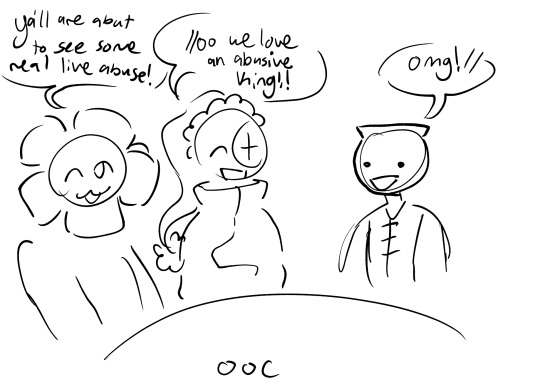

Omg crazyy...
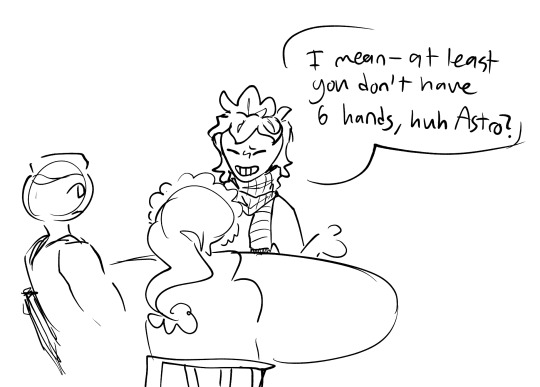
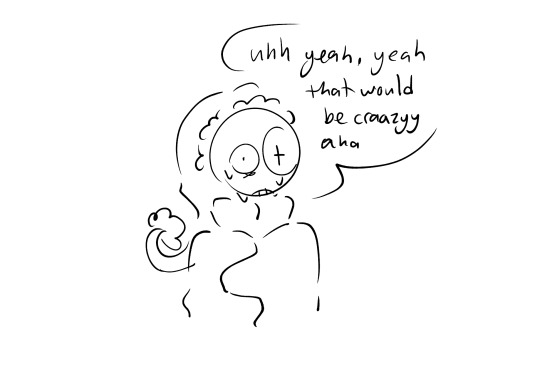
😭😭😭random
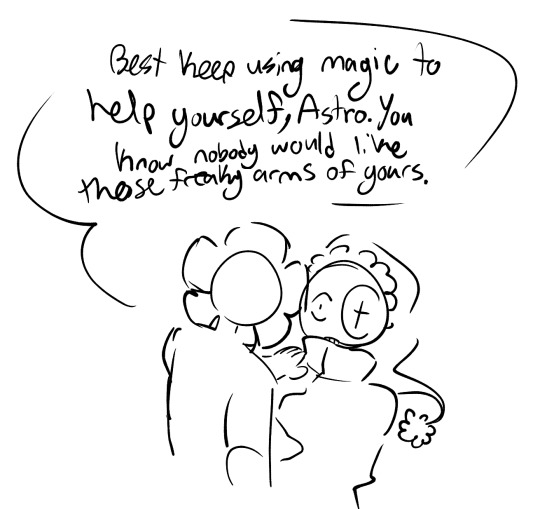
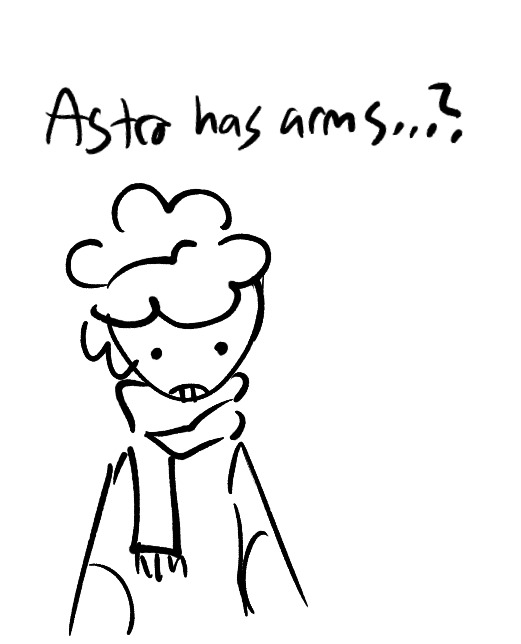
#GIVE ASTRO A BREAK CHALLENGE#he got pushed. kicked. airhorned. shot. called a kissboy. used as a hammer. had night terrors. got his biggest secret revealed (arms).#manipulated by a flower. and forced to dispose of a body#bro could NOT catch a break💔#therapist finn was fun tho#stitch art#art#dandys world#doodles#astro dandys world#finn dandys world#sprout dandys world#dandy's world rp#dandy dandys world#dandys world dandy#tagging him is so odd..#dandy: “whats wrong? dont wanna get yiur hands dirty?”#speout: “he has hands???”#i was GIGGLING#i was astro btw. idk how things kept happebing to me....#shrimpo shot me in the leg with a GUN idk where he even got it😭😭#the night terrors werent my idea either. we had a narrator which was actually REALLY FUN and awesome#bro is just doomed by the narrative i think#had to go shortly after the body disposal unfortunately but that rp was sm fun the other ppl there were so good#dandys speech when we were alone was SOO MUCH COOLER than what i put btw. i iust cant remember exactly what he said😭😭😭😭
114 notes
·
View notes
Text
“if this is about my soul take it I don’t want it without you” girl be calm
59 notes
·
View notes
Text
if y'all wouldn't mind, would you please pray for me that the surgeon i reached out to is able to work with my less than ideal circumstances and that i am able to schedule the procedure for the time that it would be easiest for me to actually get there?
#circumstances being a remote consultation because i live so far away#and that i am not working with a speech or myofunctional therapist because i cannot afford it#and because it's so far away i really want to get it done when my parents are here#so that at least someone can stay with the animals#it would just make this so much easier#and possible at all#or if not this one then at least the next one
89 notes
·
View notes
Text
physical therapy has been so much different than I thought it would be… like the massages and exercises and cold compresses are great and all
but for me the real healing has just been in spending time with other people who have chronic pain. the patients and the therapists both have personal experience with it, and there’s just…… so much comfort and understanding in that room. I feel like it’s teaching me a new way to live.
#incessant meowing#personal#one of my phys therapists got into the work after years of being a disneyland character actor#she played minnie/mickey/daffy/etc and apparently it just ruined her neck#my other therapist had a major stroke and had to regain all her muscle function#and you can only tell because she has a slight speech impediment#every single person there understands pain and how scary it is and they guide you through it beautifully#my first year being in my 30’s has been wild but i understand so much more about being human
43 notes
·
View notes
Text
I just read "Ear nose and throat surgeon" in reference to an expert of that field and I have to tell you, English speakers, that while I agree with making things understandable in your native language, you are missing out on
OTORRINOLARINGÓLOGO (otorrino for short)
73 notes
·
View notes
Text
My headcanons regarding the Feanorians' voices and speech patterns!
Feanor - medium deep and strong voice with a very distinct timbre that is easy to pick out in a full room; excellent voice control regarding pitch and volume; fast flow of speech with dynamic and pleasing intonation and metric; tends to lower his pitch at the end of a sentence; dramatic pauses
Maedhros - deep, rumbly voice with hoarse and rough elements after thangorodrim; surpringly warm timbre; can easily drown out other voices; lots of tension in his throat; usually speaks with a monotone voice and slower tempo but has amazing control over his intonation if necessary
Maglor - higher voice type with a soothing yet fresh timbre; very soft-spoken to compensate for his naturally loud voice; puts most of the stress on his vowels which creates a naturally melodic intonation but can get a bit whiny (rarely tho) ; incredible level of voice control and a huge supported range
Celegorm - deep-ish, smokey voice that vibrates nicely in his chest; tends to crack a bit around the edges; very fast flow of speech which sometimes makes him stumble with his words; no inter-word pauses; surpringly good pitch modulation (important to imitate animal speech)
Caranthir - medium deep voice with a cooler and more graceful tone; a little nasal; voice is naturally quieter than his brothers; lacking pitch and volume control which can make his speech pattern sound monotone but uses effective pausing and rhythm
Curufin - higher, smooth voice with a snob-ish timbre; more on the quiet side but effective (he WILL be heard); tends to artificially deepen his voice a bit; puts more stress on his consonants; slower flow of speech with very rhythmic, strong and intentional intonation and (over)precise articulation
Amras - medium to higher voice type; fresh timbre with a friendly but confident vibe; a little breathy with surprising amounts of head voice; neither loud nor quiet; milder intonation with a quick but effective talking speed
Amrod - very similar to his twin but quieter and more raspy than breathy; more soft-spoken and easily drowned out by other voices
Bonus Celebrimbor - smooth and rich medium voice tone; very warm and soothing timbre with a nice rumble; melodic and bouncy intonations; tends to speak quite fast but has great articulation like his father
#LOTS of dramatic pauses for Feanor to be exact#mightiest also in voice obviously#is it obvious I am a speech and voice therapist yet?#feanor#maedhros#maglor#celegorm#caranthir#curufin#amras#amrod#ambarussa#silm#headcanons#silmarillion headcanons#nin's thoughts
412 notes
·
View notes
Note
Urgh as someone on both ace and aro spectrum seeing my identity being used to justifying the no-homoing off a canonically gay and bi characters is so shitty. It's not fucking acearo rep. I left wwdits fandom post S5 as the show lost the spark for me eps being hit and miss and how the show treated Nadja. And I'm honestly I'm glad I left seeing people be so rude to you for calling what it is queerbaiting has been so disappointing. Is criticism of shows we like not allowed anymore? And yes it can still being baiting even with queer characters this shouldn't be hard to comprehend. Guess it's both queerbaiting and ship baiting. Also this is last season even if they pull korrasami and get together at the last EP it's not good rep?? It's fun and silly show but shouldn't be on pedestal of queer rep when it isn't and we shouldn't have to settle for scraps.
I can't wait to see how they're going to twist this ask into you being aphobic lmao. It means a lot to hear I'm not crazy, btw. Luckily, all people blocking me are folks I've never interacted with and my most respected followed blogs have agreed with me, so I can't be that mad.
Also, gotta laugh at the aphobic accusations, because I deadass take part in anti-aphobia orgs and initiatives irl all the time, I've fought tooth and nail to have aroace people where I live validated and most of all respected (since corrective rape is a common experience, sadly), the main character of my novel is an asexual actress who struggles with the over-sexualization of her persona and it's been praised by the community, but some folks on the no grass-touching allowed website don't like my opinion on how two CANONICALLY ALLO CHARACTERS' relationship was handled, so I guess I hate aroace people now lol
#wwdits#nandermo#wwdits negativity#actually putting this in the tags because some of you owe me an apology idc#stop throwing words like “aphobia” around like they mean nothing#one of my best friends cried in my arms because her ex tried to “fix her” by force#she had to change gyno three times because they would insist on her being sick and needing to be fixed or not believing her#I told my former therapist about it and she said asexuality is not real and it's a mental illness#but me saying they no-homoed two at the very least alloromantic and one of them extremely allosexual is hate speech???#shut up forever#liking the resolution of a ship isn't activism#neither it is not liking it btw#but y'all need to leave me alone or learn to block me properly because I still can read everything#touch grass#calling me out publicly but not even talking to me smh#platonic male friendship isn't queer rep#die mad about it
18 notes
·
View notes
Text
5 Myths About Speech Therapy for Kids Every Parent Should Know

Speech therapy plays a vital role in helping children overcome communication challenges, but misconceptions about it can prevent parents from seeking the support their child needs. These myths can lead to unnecessary delays in addressing speech and language issues, which are best handled early.
In this blog, we’ll debunk five common myths about speech therapy for kids, providing clarity and guidance for parents navigating this journey.
Myth 1: “My Child Will Outgrow Their Speech Delay”
The Truth:
While some children may naturally outgrow minor speech delays, many need intervention to develop effective communication skills. Speech and language milestones provide important benchmarks. If a child consistently misses these milestones, it’s best to consult a speech-language pathologist (SLP).
Why Early Intervention Matters:
Delaying therapy can lead to difficulties in school, social interactions, and self-esteem. Early intervention provides tools to overcome challenges before they become ingrained habits.
Myth 2: “Speech Therapy Is Only for Kids Who Don’t Talk”
The Truth:
Speech therapy addresses a wide range of challenges beyond just speech delays, including:
Articulation issues (mispronouncing sounds).
Stuttering or fluency difficulties.
Language comprehension (understanding words and sentences).
Social communication skills (engaging in conversations and using gestures).
Who Benefits from Speech Therapy?
Even children with minor speech or language concerns can benefit. Therapy can help them develop clearer communication, better listening skills, and stronger social connections.
Myth 3: “Speech Therapy Is Boring for Kids”
The Truth:
Speech therapy is anything but boring! Modern therapy sessions are designed to be engaging, playful, and tailored to each child’s interests.
What Makes Therapy Fun?
Play-Based Activities: Games, toys, and storytelling make learning enjoyable.
Interactive Tools: Apps, videos, and crafts are often used to teach concepts creatively.
Real-Life Scenarios: Therapists use everyday situations to practice skills, ensuring they’re relatable and practical.
Myth 4: “Parents Shouldn’t Get Involved in Therapy”
The Truth:
Parents are a critical part of their child’s progress in speech therapy. Therapists often provide strategies and exercises for parents to practice at home, reinforcing skills learned during sessions.
How Parents Can Help:
Practice Daily: Incorporate speech exercises into everyday routines.
Model Communication: Speak clearly, use gestures, and encourage conversation.
Celebrate Small Wins: Praise your child for their efforts to boost confidence.
Myth 5: “Speech Therapy Is Only for Severe Cases”
The Truth:
Speech therapy is beneficial for children across a spectrum of needs, from mild articulation issues to complex language delays.
Examples of When Therapy Helps:
A child struggles to pronounce certain sounds (e.g., “r” or “s”).
Difficulty following instructions or understanding questions.
Challenges in forming sentences or expressing thoughts clearly.
Even mild concerns can impact a child’s learning and social development if left unaddressed.
Why Debunking These Myths Is Important
Misconceptions about speech therapy can prevent children from getting the help they need to thrive. By understanding the realities of speech therapy, parents can make informed decisions and support their child’s communication journey with confidence.
When to Seek Help
If you notice signs of speech or language delays, consult your child’s pediatrician or a speech-language pathologist. Early intervention can pave the way for stronger communication skills and greater confidence.
Conclusion
Speech therapy is a powerful tool for helping children overcome communication challenges, but it’s often misunderstood. By debunking these myths, we hope to empower parents to take proactive steps in supporting their child’s development.
If you suspect your child could benefit from speech therapy, don’t hesitate to reach out. The earlier you start, the greater the impact it can have on their future success and happiness.
#speech and language therapy#speech therapy for kids#online speech therapy#speech therapy#child development#speech delay#speech therapists
0 notes
Text
honestly, what cemented ennoshita as my top fave hq character was that he became a physical therapist.
initially, i loved him a lot because his story of running away but coming back to face it all resonated with me. also he's really cute hehe. however, i have a lot of love for allied health/rehab professionals and what they do. it's not easy, despite what some people may think.
for context, i'm a speech-language pathology student. i frequently meet other physical therapy and occupational therapy students, and i really respect what they do (physical therapists, in particular, because i still struggle to wrap my head around all the kinds of things under their scope).
so, when i saw "ennoshita chikara (22) physical therapist" i downright screamed in joy at the allied health representation, and how fitting it is for ennoshita to be in that field.
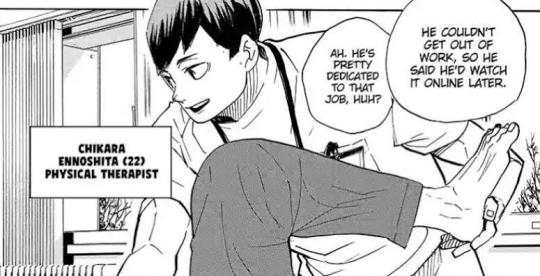
"ah, he's pretty dedicated to his job, huh?" I KNOW IT'S JUST ONE LINE BUT 😭 i admire service-oriented people driven by genuine love, and ennoshita is just THAT. to him, it's not being flashy or getting something in return. he will stay committed and do his best to be reliable.
furthermore, ennoshita is amazing at reading and understanding people. that is such an important trait to have when interacting with clients. all disabilities greatly impact one's life; the last thing anyone needs is a dismissive and inconsiderate care provider.

it makes me so happy that he ends up here. all his strengths and growth as a high school volleyball player translated well into his future occupation.
also, it's so sweet to see that there are opportunities for him to reconnect with his love for volleyball, despite no longer being a player. the captain in him definitely comes out when talking to clients involved in sports!
anyway, thank you furudate-sensei for ennoshita chikara (22) physical therapist.
#haikyuu#haikyuu!!#stellar speaks#ennoshita chikara#karasuno#ENNOSHITA APPRECIATION POST#i love this guy so bad#ennoshita chikara (22) physical therapist#fun fact: i wanted my managersona to major in slp like me so she could go study at the same uni as ennoshita HAHAHA#btw i wish more people knew about occupational therapists and speech-language pathologists aaaaaa#stellartheslp
35 notes
·
View notes
Photo
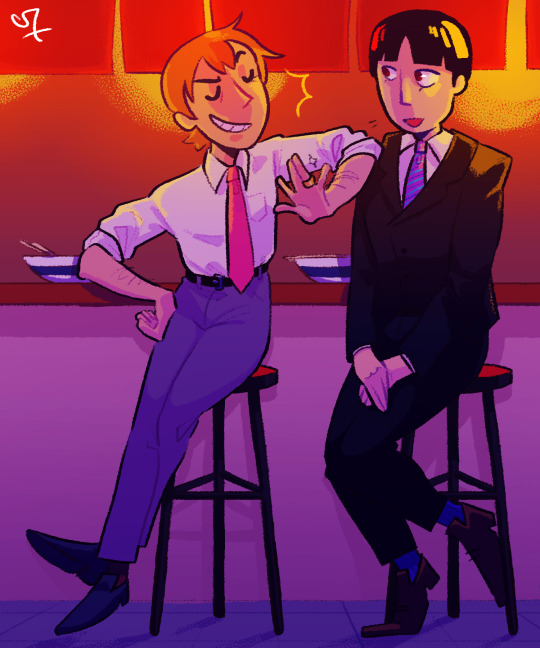
reigen would be so proud of older mob :,)
#they're out for ramen after work#i need to post my post canon designs......#i love grown mob ToT i like to imagine he'd be like a child psychologist or speech therapist or smth#but he and reigen meet up often still. reigen is v proud and v fond of all of his kids lol#and yes thats a wedding ring#serizawa is at home having catchup dinner with shou#had to look up what a ramen stand looks like but i think i got it accurate?#at least i hope so lol#didn't put any characters tho bc i didnt think i get them to look right esp when i dont know what they mean#mp100#reigen arataka#shigeo kageyama#serirei#mob psycho 100#not ship BTW. ill rip you to shreds
255 notes
·
View notes
Text
I am choking on my own stress.
Muscle tension dysphonia is a common vocal cord disorder. There's a variety of potential causes but the end result is the same. Your vocal cords become too tense to vibrate and lock up, producing speech that is strained at best or nonexistent at worst. For the past eight weeks I've alternated between the two.
Psychosomatic. relating to the interaction of body and mind. illness caused or worsened by a mental factor. On the camera screen my vocal cords strain and tense and ultimately remain shut as I try to force words through. I can't relax, can't breathe in, can't let the tension choking me go enough to follow even a simple exercise.
I am holding the tension of losing my job of nine years, of my sister's divorce, of my mom's illness, of my best friend's pain, of the election, of my two cats dying, of covid fear, of my father aging, of my neighbor's blasting a movie, of bright lights, of responsibilities and potential and promises I have failed, over and over and over. I am holding tension that is stuck in my chest, my stomach, my throat, my vocal cords.
the tension is load bearing. To release it means to face all that grief. to acknowledge my loss, my anger, my fear. Instead I choke myself with it to the point of muteness, strain harder and harder to spit words out and pretend this is sustainable. that I can keep ignoring the score my body is keeping. that i can continue to not acknowledge all the ways I have failed my potential and promise and everything I was supposed to accomplish instead of folding at the first signs of stress.
I am choking on the words I can't allow myself to make because they're screams
#muscle tension dysphonia#anyway doctor appointment today went great#i guess#ended up seeing the same speech therapist I have every time I go there#which is not a complaint she's really good it's just bizarre#i need to find a new therapist#because it's not just vocal exercises that will fix this#i need to do something to LET myself let that tension go#and I don't know how I will#and I'm just really fucking tired and sad#mute#mtd
10 notes
·
View notes
Text
So I finally found a way to watch tristamp in English dub (I only ever watched the series in Japanese). I haven’t done any deeper thoughts and analysis, and I’m only halfway through the series but here’s my impression so far:
- I love English dub Vash, especially his gibberish noises, such a chaotic dumbass (affectionate), and although some of his jokes and mannerism didn’t translate as well as I hoped, they did a very good job. They deserved two dozen donuts. (although if you hold me at gunpoint and ask me to choose English or Japanese Vash I will choose the Japanese version with a thin margin because I have personal bias towards Matsuoka Yoshitsugu [he’s from where I live lol, and I’m a big fan])
- I’m also in love with how they play Legato and Roberto, especially Legato, I was surprised by the lack of the feeling out of place (Is that the right word? sorry my brain suddenly stopped working in English) that you usually have when you hear a show dubbed in another language you’re not used to hearing. So smooth. And they nailed the drunkle speech with Roberto.
- I honestly was disappointed with the lack of accent in Wolfwood’s speech (maybe I just didn’t hear it correctly? Idk) because he speaks in heavy Kansai dialect in Japanese, even when he was a child (also casting Hosoya Yoshimasa really emphasized the accent). A huge missed opportunity on the English dub, in my opinion. I was expecting Wolfwood with a heavy Southern accent or something. And on that note they also missed the chance to add some dialect for the worm hunters on episode 4.
- English dub Meryl feels mature and a lot more pulled together to me compared to the Japanese version, which sounds very pristine and innocent until she starts learning about the world. It makes her a little… out of place for me who’s used to Meryl speaking in a very polite formal Japanese to everyone (even when she’s yelling in rage or when she’s cursing people). I think it suits Meryl from ‘98 anime more than tristamp Meryl. Probably because you can’t really translate her distinct way of speaking accurately, it’s not anyone’s fault, just a matter of different language. But I guess I like the Japanese version better for Meryl. I just love the way she speaks, shame there’s no English equivalent to her speech style.
- I don’t like English dub Nai. I’m 100% going with the Japanese version in this. Not the performance, though, I know translations are really hard and I do think the English VA did a great job, but as someone who’s used to how Nai speak in Japanese, the dub just… didn’t feel right. In Japanese Nai speaks in a relatively rougher manner compared to Vash (in how he chooses his words, also the subtle but different way he talks to humans and to Vash) and it didn’t show as much in the English dub. And his pretentious speech that sounds like some people from the church near my house doesn’t get carried to the English dub, I guess. In English he just sounds like a scary villain to me, while in Japanese I can feel his emotions and (warped) love towards Vash just from his words. I saw someone pointing out that Nai refers to the dependent plants with feminine pronouns, and it’s even more prominent and emphasized in the Japanese version. They’re not wrong. Maybe in English it can come across as a bit misogynistic(?), I don’t know, but I like how he does this in Japanese, because to me it feels like he’s always trying to refer to them as “persons” and not “things”, although his treatment towards them is contradictory.
This ended up longer than I expected but overall I enjoyed the English dub and I love analyzing different languages. I wanna know how it feels for people who know absolutely zero Japanese watching the series in English dub and in Japanese with English subtitles. I know that there were differences in the subtitles and the dub but for me I can’t compare English sub and dub because I’d just go with my Japanese interpretation if I watch the subbed version (or I’d rather just ditch the subtitle altogether because sometimes it’s making my brain confused when I speak both languages).
Also to people who write Trigun fanfics in English, where do you base the character speech from? I don’t know how to translate Japanese dialects, so Wolfwood, for example, is very difficult for me to write in English.
#trigun#trigun stampede#my ramblings#I am not very good at articulating#and my thoughts are always branching everywhere#anyway I want to write a fanfic but I have no idea how to write the characters speech#I only know the Japanese version of all trigun media#and I don’t like reading comic/manga so I’m kinda reluctant to re-read the manga in English#I read Wolfwood’s lines in Hosoya-san’s voice even in English fanfics#unrelated note#I’ve been trying to convince my therapist to watch trigun lmao#she said she’s gonna watch it today
45 notes
·
View notes